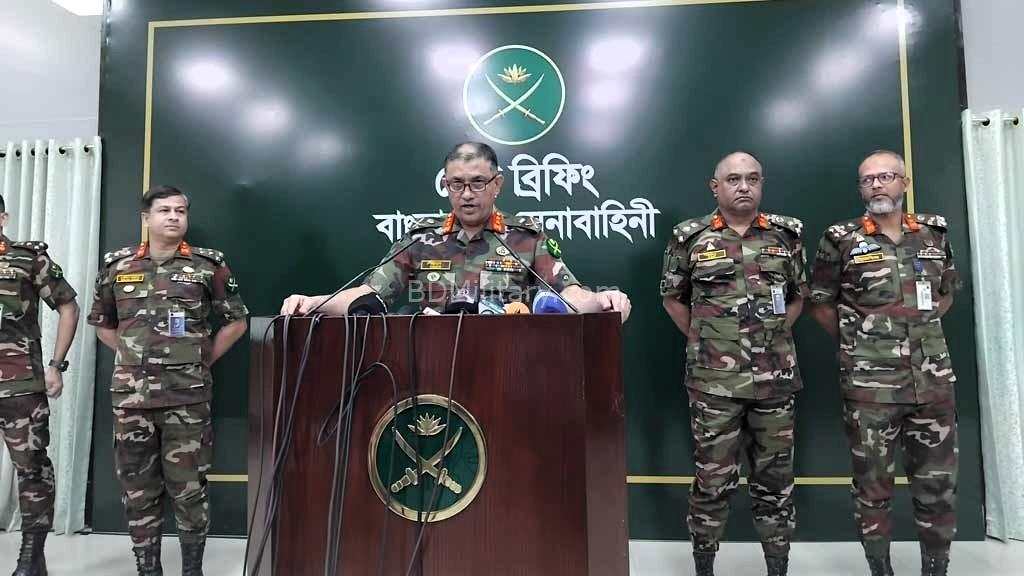The Bangladesh Army has confirmed that 15 of its officers have been taken into custody after arrest warrants were issued against 30 individuals accused of involvement in enforced disappearances and crimes against humanity.
The announcement was made during a media briefing held at the Officers’ Mess in Dhaka Cantonment on Saturday, amid growing public calls for the arrest and prosecution of the suspects.
The International Crimes Tribunal (ICT) earlier this week issued arrest warrants against 30 individuals after accepting two cases filed by the prosecution concerning the abduction and torture of political dissidents during the previous Awami League government.
According to the tribunal, 17 suspects are accused of torture and abuse at the Rapid Action Battalion’s Taskforce Interrogation (TFI) Cell, while 13 others face similar charges linked to the Joint Interrogation Cell (JIC).
Deposed Prime Minister Sheikh Hasina has been named the principal accused in both cases. Her former defence and security adviser, retired Major General Tarique Ahmed Siddique, and five former directors general of the Directorate General of Forces Intelligence (DGFI) are also among those charged.
Of the 30 suspects, 25 are either current or former Bangladesh Army officers. Major General Md Hakimuzzaman, Adjutant General of the Bangladesh Army, confirmed that 15 serving officers are currently in military custody, while one remains unaccounted for.
“A total of 15 accused officers are now under army custody, while one officer remains missing. He left his residence one morning and has not returned since. Efforts are underway to determine his whereabouts,” Maj Gen Hakimuzzaman told reporters.
The Army Headquarters stated that the arrest warrants were formally circulated to the Inspector General of Police (IGP) and 12 other relevant offices, including:
the Chief of Army Staff, Chief of General Staff, Adjutant General, Director General of DGFI, Director General of NSI, Principal Staff Officer (Armed Forces Division), Secretary to the Chief Adviser’s Office, Director of Military Intelligence, Director of Personnel Service Directorate, Commandant of the Army Security Unit, Provost Marshal, and the Commanding Officer of the Army Military Police Unit.
Two Separate Cases
The first case accuses Sheikh Hasina, Tarique Ahmed Siddique, and 17 others of abduction and torture at the RAB’s TFI Cell, while the second case involves Hasina, Siddique, and 13 others for similar crimes committed at the JIC.
Among the accused are several former chiefs of the DGFI and the Rapid Action Battalion (RAB).
Case 1: TFI Cell
Charged with five counts of crimes against humanity, the accused are:
Sheikh Hasina, Tarique Ahmed Siddique, former Home Minister Asaduzzaman Khan Kamal, former Inspector General of Police Benazir Ahmed, former RAB Director General M Khurshid Hossain, former RAB Director General Barrister Harun ur Rashid, Colonel Anwar Latif Khan, Brigadier General Jahangir Alam, Tofayel Mostafa Sarwar, RAB officer KM Azad, Brigadier General Kamrul Hasan, Mahbub Alam, Abdullah Al Momen, Sarwar Bin Kashem, Khairul Islam, Moshiur Rahman Jewel, and Saiful Islam Suman.
Case 2: JIC
In the second case, involving enforced disappearances and torture within the Joint Interrogation Cell, the accused are:
Sheikh Hasina, Tarique Ahmed Siddique, former DGFI Director General Lieutenant General (retd) Mohammad Akbar Hossain, former DG Major General (retd) Saiful Abedin, Lieutenant General (retd) Md Saiful Alam, former DG Lieutenant General Tabrez Shams Chowdhury, former DG Major General (retd) Hamidul Haque, Major General Towhidul Islam, Major General Sarwar Hossain, Major General Kabir Ahmed, Brigadier General Mahbubur Rahman Siddique, Brigadier General Ahmed Tanvir Majhar Siddique, and Lieutenant Colonel (retd) Makhsurul Haque.
According to legal representatives, four of the accused army officers are still in active service. Under the amended International Crimes Tribunal Act, however, serving officers charged in such cases are barred from holding official posts.
Hasina and Siddique in Exile
Sheikh Hasina fled to India with her sister Sheikh Rehana on 5 August last year following a mass student-led uprising that forced her from power. She is believed to have remained in India since.
The whereabouts of Tarique Ahmed Siddique, however, remain uncertain. Media reports suggest that he was denied citizenship by Malta but has secured long-term residency in Malaysia under the “Malaysia My Second Home” programme. Siddique is also understood to hold permanent residency in Dubai, where he owns substantial property and has made significant investments.
The developments mark a major turning point in Bangladesh’s ongoing reckoning with allegations of state-sanctioned human rights abuses during the Awami League’s final years in power.



